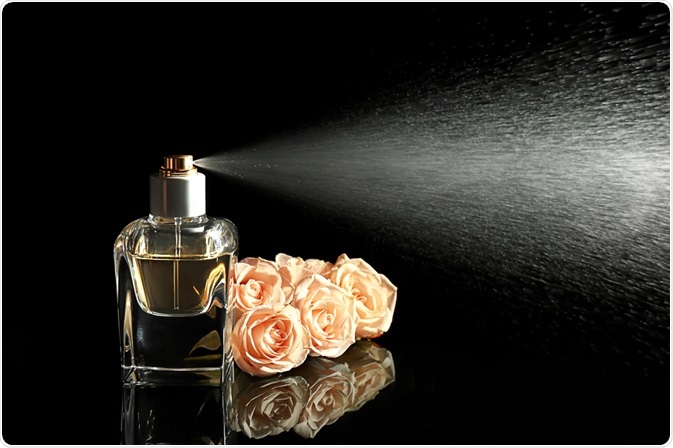A perfume or fragrance allergy is the second most common cause of skin allergies according to contact dermatitis expert, Dr. Sandy Skotnicki-Grant, from the Bay Dermatology Centre in Toronto.
Fragrance sensitivity can be defined as irritation or adverse reaction to chemicals in a perfume or other scented products such as air fresheners and cosmetics. Sensitivity to strong odors can make those who are allergic to these products severely ill. People with asthma or other respiratory illness can be more susceptible to fragrance allergies compared to healthy individuals.

Image Credit: Africa Studio / Shutterstock.com
Symptoms of fragrance allergy
Sensitivities to perfumes or fragrances, in general, can trigger various unpleasant reactions in those affected. Some common symptoms of perfume allergy include:
- Mild to severe headache
- Skin irritation, itching, and rashes
- Sneezing, coughing, and runny nose, also called allergic rhinitis
- Breathing difficulties, dizziness, and fatigue
- Muscle aches
- Watery, red, and itchy eyes
- Wheezing
- Inability to concentrate
- Swelling (angioedema)
- Nausea and vomiting
Studies have shown that for individuals suffering from migraines, strong fragrances from perfumes or colognes can even trigger a migraine attack.
Fragrance chemicals in perfumes and other products
Individuals with widespread exposure to these sensitizing chemicals are at risk of contact sensitization to such fragrances. Many of these chemicals are highly unstable and readily oxidize during storage or as a result of their exposure to sunlight and air. These oxidation products act as phototoxic agents and potent sensitizers.Perfumes contain a mix of several ingredients that include a complex blend of natural essences, as well as synthetic chemicals. The average perfume or cologne contains about 14 chemical ingredients that are capable of triggering mild to severe allergic reactions in fragrance-sensitive individuals.
One such fragrance chemical, limonene, is used in cleaning products as a solvent. Limonene can not only break down and form potent sensitizers but also has the potential to react with ozone generating hazardous pollutants such as acetaldehyde and formaldehyde, which pose a serious risk of various health concerns. Another commonly used fragrance chemical is linalool, which is a component of lavender oil.
The derivatives of linalool, which include linalyl acetate and linalyl anthranilate, generate contact allergens upon exposure to air. In addition to fragrance ingredients, perfumes, and body sprays also contain stabilizers, solvents, preservatives, ultraviolet (UV0 absorbers, and dyes. Apart from affecting the user, fragrance allergies also cause passive reactions to others in contact with or sharing space with the wearer.
How to prevent/treat fragrance sensitivity
One way to prevent fragrance sensitivity is to avoid products containing the sensitizing substance(s). Carefully observing labels on products and choosing products labeled "fragrance-free" or "unscented" can help, although these labels are not always reliable and the product can still contain herbal ingredients that may induce a reaction.
In addition to this guidance, it is also recommended that individuals with these fragrance allergies limit their exposure to perfumes or scents worn by others at public places or workplaces. Fragrance-sensitive people should ensure that their coworkers are aware of their condition.
A dermatologist or allergist can recommend safe products based on individual sensitivities. The allergen causing the sensitivity is usually diagnosed with the help of a patch test on the skin of the affected individual.
A mix of several fragrance ingredients is used for testing. A positive patch-test for a particular ingredient would indicate that the person is allergic to that fragrance chemical. With that knowledge, the person could avoid products containing that ingredient in the future. This is not easy though, as labels on fragranced products normally don’t reveal every single ingredient.
Fragrance sensitivity at the workplace
Employers are becoming increasingly accommodative of fragrance-sensitive individuals. Some companies have stopped the usage of air fresheners and use fragrance-free cleaning products in order to minimize the use of fragrant chemicals in indoor environments. Companies are also educating employees about this issue and implementing a voluntary fragrance-free policy to the extent possible.


0 Comments